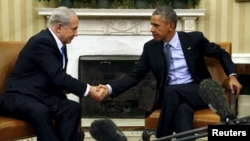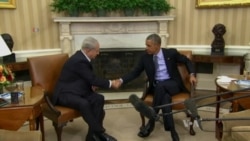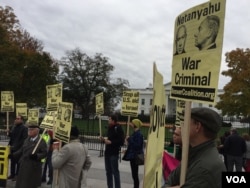With a handshake over the “extraordinary” bond between their two countries, U.S. President Barack Obama and Israeli Prime Minister Benjamin Netanyahu sought Monday to dispel the discord that was most visibly seen during the U.S.-led negotiations on a nuclear deal with Iran earlier this year.
“It’s no secret that the prime minister and I have had a strong disagreement on this narrow issue, but we don’t have a disagreement on the need to making sure that Iran does not get a nuclear weapon,” Obama said.
In their 13th meeting since the president took office, Obama and Netanyahu looked to move past their differences and focus instead on areas of common ground, including the deteriorating security situation in the Middle East and the fight against Islamic State and other extremist groups.
“I think this is a tremendously important opportunity for us to work together to see how we can defend ourselves against this aggression and this terror; how we can roll back. It’s a daunting task,” Netanyahu said.
Brookings Institution Fellow Natan Sachs says now that the Iran deal is being implemented, the interests of the two countries are aligned again.
“There is a sense of business as usual – going back to the very important issues the two countries have to discuss,” Sachs said.
Security Cooperation
During Monday’s talks in the Oval Office, Obama highlighted the two countries’ close military and intelligence cooperation, as the United States mulls more military aid to Israel.
“The military assistance that we provide we consider not only an important part of our obligation to the security of the state of Israel, but also an important part of U.S. security infrastructure in the region, as we make sure that one of our closest allies cannot only protect itself but can also work with us in deterring terrorism and other security threats,” Obama said.
Israel already receives more than $3 billion a year in U.S. military aid, and officials say Netanyahu hopes to get that raised to $4 billion to $5 billion annually. The current 10-year arrangement expires in 2017.
Obama "has championed a sharing of intelligence, security cooperation and the guarantee of what’s called the qualitative military edge of Israel. That is something Obama has supported throughout his term. It’s not just political speak – its actually true,” Brookings Institution’s Sachs noted.
Prime Minister Netanyahu expressed appreciation for U.S. support of Israel.
“I want to thank you for your commitment to further bolstering Israel’s security in the memorandum of understanding that we’re discussing. Israel has shouldered a tremendous defense burden over the years, and we’ve done it with the generous assistance of the United States of America,” the Israeli leader said.
Israeli-Palestinian Peace
Also dominating more than two hours of Oval Office talks: the Israeli-Palestinian conflict.
Obama condemned recent Palestinian attacks on Israeli civilians, called for a de-escalating of tensions and urged a return to the path towards peace, without referring specifically to his support for a two-state solution.
Netanyahu spoke directly on the issue.
“We’ll never give up the hope for peace. And I remain committed to a vision of peace of two states for two peoples, a demilitarized Palestinian state that recognizes the Jewish state,” the Israeli prime minister said.
The remarks come just months after Netanyahu told a reporter that a Palestinian state would never be formed under his watch, while campaigning for his Likud party during Israel’s parliamentary elections in March.
White House press secretary Josh Earnest called Netanyahu’s remarks on Monday encouraging and urged a “follow through,” but expecting none during Obama's remaining time in office.
“We have been quite candid about the fact that given the dynamic on both sides, that it’s unlikely that that two-state solution will be reached in the next 14 months. It’s even more unlikely that talks in pursuit of that two-state solution will begin in the next 14 months,” Earnest told reporters.
Protesters
Outside the White House, a small group of demonstrators, including Rabbi Yisroel Dovid Weiss of “Jews United Against Zionism,” blamed the stalemate on Netanyahu and his government’s policy towards Palestinians.
“If the politicians would not be so intimidated, and they could step back and see that religion could coexist. So it’s not futile to try to bring a peace by removing this totally, flawed and wrong government that is there,” Weiss said.
Other protesters like Veterans for Peace member Michael Marceau called for an end to U.S. military aid to Israel, saying the money would be better spent on returning American military service personnel.
“How many families do we see destroyed by multiple deployments in Iraq and Afghanistan, and we see this money being spent on destruction and not help for our military service members and their families who need it,” he said.







